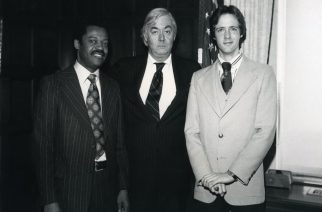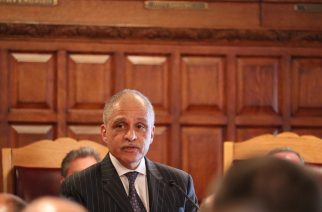
Senators Brad Hoylman and Jamaal Bailey introduced a bill they would enhance the free speech protections of New Yorkers by banning the use of art created by a defendant as evidence against them in a courtroom.
Their “Rap Music on Trial” legislation (S.7527) would protect all artists and content creators, including rappers, from having their lyrics wielded against them by prosecutors, if they should ever appear in court.
Specifically, the bill “establishes an assumption of the inadmissibility” of evidence related to a defendant’s creative or artistic expression against that person during a criminal proceeding.
“Art is creative expression, not a blueprint of criminal plans,” Holyman said. “Yet we’ve seen prosecutors in New York and across the country try to use rap music lyrics as evidence in criminal cases, a practice upheld this year by a Maryland court. It’s time to end the egregious bias against certain genres of music, like rap, and protect the First Amendment rights of all artists.
In September 2019, Daniel Hernandez better known by his stage name Tekashi69 or 6ix9ine was in a New York District Court where his rap lyrics were introduced in court and used to force Hernandez into becoming a government witness to avoid a longer sentence.
The rap genre has been scrutinized for decades especially in New York. Seven years ago, recording artist Bobby Shmurda and Rowdy Rebel were arrested on charges of conspiracy, reckless endangerment and gun possession. Unfortunately for Shmurda, his famous song contained lyrics which found its way to the jury at his felony trial.
The legislation from Senators Hoylman and Bailey would guarantee freedom of creative expression in New York by prohibiting prosecutors from using creative expression as criminal evidence against a person without clear and convincing proof that there is a literal connection between the creative expression and the facts of the case.

“There is no New York without art, whether it is provoking or inspiring, beautiful or crude,” states the bill memo. “This legislation would guarantee freedom of creative expression in New York by prohibiting prosecutors from using creative expression as criminal evidence against a person without clear and convincing proof that there is a literal, factual nexus between the creative expression and the facts of the case.”
Sen. Bailey hopes that the bill ends the discriminatory practice by ensuring that there is a connection between the speech sought to be admitted into evidence and the alleged crime.
“The right to free speech is enshrined in our federal and state constitutions because it is through this right that we can preserve all of our other fundamental rights,” Bailey said. “The admission of art as criminal evidence only serves to erode this fundamental right, and the use of rap and hip-hop lyrics in particular is emblematic of the systemic racism that permeates our criminal justice system.”
The bill was introduced into the Senate Rules Committee on November 17. There currently is no Assembly version of the bill.
This is a new bill and it would have no fiscal implications for the state or local governments.









